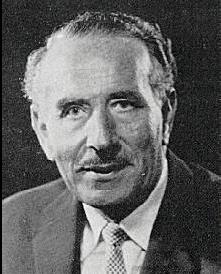Alfred J. Marrow facts for kids
Quick facts for kids
Alfred J. Marrow
|
|
|---|---|
 |
|
| Born |
Alfred Josephon Marrow
March 8, 1905 New York City, U.S.
|
| Died | March 3, 1978 (aged 72) New York City, U.S.
|
| Alma mater | New York University Columbia University |
| Known for | Industrial Relations Group Dynamics T-groups |
| Spouse(s) | Monette Courod |
| Relatives | Andy Samberg (grandson) |
| Awards | Kurt Lewin Memorial Award (1964) |
| Scientific career | |
| Fields | Industrial psychology |
Alfred Josephon Marrow (born March 8, 1905, died March 3, 1978) was an important American. He was an industrial psychologist, which means he studied how people work best together in companies. He was also a business leader, a civil rights activist, and a philanthropist. A philanthropist is someone who gives money to help others.
Growing Up
Alfred Marrow was born in New York City. He was the second of six children. His parents, Rebecca and Dr. Isidore L. Marrow, were from Lithuania.
His family later bought land in Long Beach, New York. They built a large house there. This house was a place for many family get-togethers.
Alfred's father, Isidore, was involved in helping the community. He was a director at the Israel Zion Hospital. He also worked with the Jewish Education Committee.
Alfred Marrow went to college in New York. He earned his master's degree from Columbia University. Later, he received his doctorate degree from New York University in 1937.
What He Did
Alfred Marrow followed in his father's footsteps. He worked in the family business. He also continued his education. Like his father, he was involved in helping others. He worked in charity and education.
Marrow was known as an industrial psychologist. This field looks at how people behave at work. It helps make workplaces better for everyone.
He wrote many books during his life. One of his books was about his friend, Kurt Lewin. Lewin was also a famous psychologist.
His Family Life
While studying in New York City, Alfred married Monette "Monte" Courod. She was born in Russia. They had a son named Paul Bennett. They also adopted a daughter named Marjorie.
Alfred Marrow had five grandchildren. One of his grandchildren is the famous actor and comedian Andy Samberg.
Later in his life, Marrow lived in both Manhattan and Palm Beach, Florida. He passed away in New York Hospital. He died from problems related to leukemia.
Important Roles
Alfred Marrow held many important positions. He was a leader in business and in helping the community.
- He was the president and chairman of the Harwood Manufacturing Company from 1940 to 1976. He took over this role from his father.
- He led the Mayor's Commission on Intergroup Relations in New York City. This group worked to improve relations between different groups of people.
- He was a leader for the American Jewish Congress.
- He was president of the National Academy of Professional Psychologists.
- He served as a director for several colleges. These included the New School for Social Research, Antioch College, and Gonzaga University.
- He was also a fellow of the New York Academy of Science.
Alfred Marrow also advised many organizations. He was a consultant for groups like the American Foundation for Management Research.
Books He Wrote
Alfred Marrow wrote many books about psychology and human relations. Here are some of them:
- Goal Tensions and Recall (1938)
- Living Without Hate: Scientific Approaches to Human Relations (1951)
- Making Management Human (1957)
- Changing Patterns of Prejudice: A New Look at Today's Racial, Religious, and Cultural Tensions (1962)
- The Practical Theorist: The Life and Work of Kurt Lewin (1969)
- The Failure of Success (1972)
- The T-group Experience: An Encounter Among People for Greater Self-Fulfillment (1975)
He also helped edit a book by Horace M. Kallen called What I Believe and Why - Maybe: Essays for the Modern World (1971).
Awards He Received
Alfred Marrow was recognized for his important work.
- In 1958, he received an award from Mayor Robert F. Wagner, Jr. of New York City. This was for his work in making sure everyone had equal chances in housing.
- In 1964, he received the Kurt Lewin Memorial Award. This award honored his excellent contributions to social psychology.
 | Lonnie Johnson |
 | Granville Woods |
 | Lewis Howard Latimer |
 | James West |

